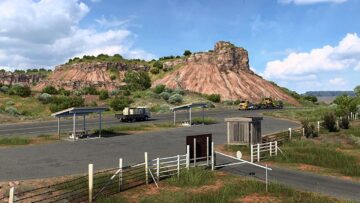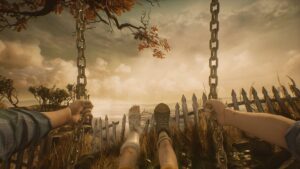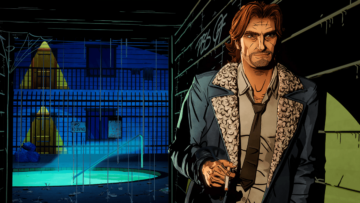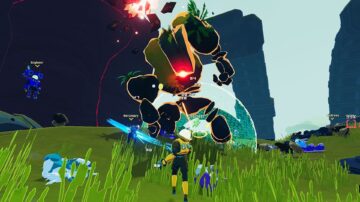5th April 2024
Hello! Welcome back to our regular feature where we write a little bit about some of the games we’ve been playing over the past few days. This week, we’re mixing it up a bit with a GDC-based indie preview special, highlighting several game demos we tried out in late March (And also it’s just me, Chris – hello!).
If you fancy catching up on some of the older editions of What We’ve Been Playing, here’s our archive.
Horses – PC, others TBA, 2024
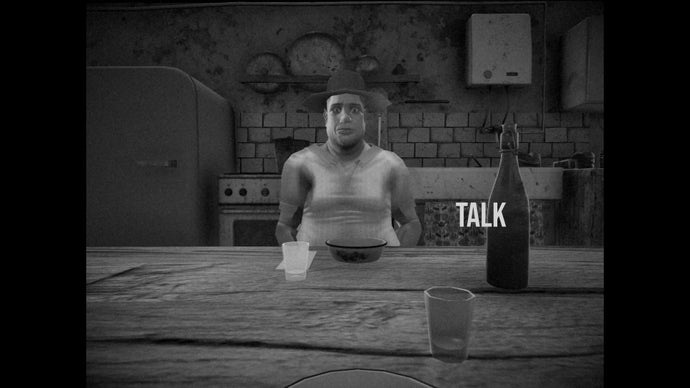
Boutique developer-publisher Santa Ragione won the IGF Award for Best Narrative during GDC with its previous game, the wonderful Mediterranea Inferno, and Horses – developed by Andrea Lucco Borlera, seems like another gem.
This one’s decidedly quieter though, with minimal dialogue and an eerily rudimentary construction. Borlera cited Czech surrealists and Yorgos Lanthimos, the Greek director of Poor Things and The Favourite, as inspirations to me out at GDC’s Day of the Devs, with Horses playing out in the style of a deeply unsettling silent film. Expect speech cards for dialogue, slow and manual mechanics, and violently close-up shots of people chewing, as you take on the role of a young new farmhand on a ranch that plays home to a herd of naked, horse-headed slave people.
It’s a simpler thing in practise than some of Santa Ragione’s previous games – effectively you are waking up and slowly carrying out simple, if escalating strange tasks each day, like watering plants, feeding the dog, or, erm, burying bodies, as a story takes shape around you – but the magic here is in the atmosphere and tone. Horses is magnetically sinister. It’s also a rare attempt at using actual, suspended meaning in a game. You’ll need to bring something of your own to the farmhouse table here, and meet this thing halfway.
-Chris Tapsell
Thank Goodness You’re Here – PC, PS5, Switch, 2024
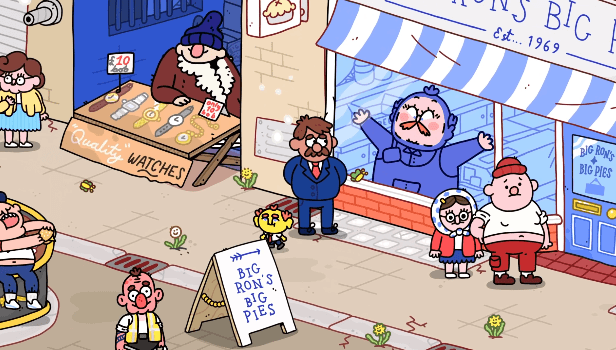
Few games can take what is effectively a single joke and build a game out of it, but Thank Goodness You’re Here might. The joke in this case is a self-deprecating poke at old-school northernness and near-incomprehensible English-isms, as you, a tiny travelling salesman, potter about the small, fictional town of Barnsworth.
For whatever reason, your only means of interaction here is slapping things (developer Coal Supper describes it as a “slapformer”), those things varying from blocked hose pipes to giant fish to the inside of a big pie-baking oven. The charm of this one is the way it brings forward its peevishness, with characters’ tiny faces comically smooshed into the middle of their giant heads, the animation snappy, and the hand-drawn art a mix between old-fashioned newspaper cartoons and modern kids TV. The proof of it, though, will be in whether Thank Goodness You’re Here can get beyond the basic humour of slapping people to make them bark variations of “Ey up!”, and also stay on the right side of laughing with, vs. laughing at.
-Chris Tapsell
Militsioner – PC, date TBC
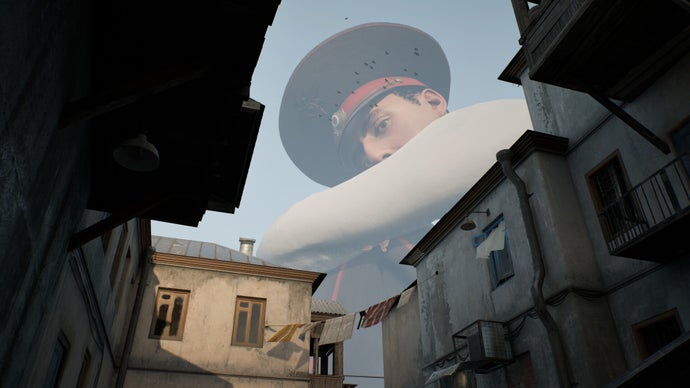
Another eerie and oppressively atmospheric European venture, Militsioner takes a giant-sized swing at the topic of authoritarianism – but it’s also sort of funny. Your task here is to navigate a dilapidated, Russian town while evading the gaze of a giant policeman in the sky.
Ostensibly a kind of stealth-survival scavenger, Militsioner has you rummaging through kitchens and climbing up to roofs and into windows for resources – traded away at a strange in-game merchant – but the twist is that this big copper is also a bit of a baby. You’ll need to chat with him intermittently, manipulating his mood with adulation, obedience or reassurance while he sulks or demures – or by presenting him with the occasional gift.
The test will be whether this one can get past the fantastically surreal concept to build a game that remains genuinely interesting and engaging over time. (And quick aside: it also had me feeling very sorry for the poor soul who picked this one up to play after me who, in the absence of anyone there to help explain the demo, didn’t realise they’d skipped an entire tutorial and needed to restart the demo from scratch – and so just ran about looking lost, while being intermittently yelled at by a giant. If you’re reading this, I hope you figured out how to reset it.)
-Chris Tapsell
Hyper Light Breaker – PC, date TBC
A slightly disappointing one, this, sadly – though don’t write it off yet, as it could’ve just been the difficult nature of the demo. Hyper Light Breaker is the long-awaited successor to Hyper Light Drifter from developer Heart Machine, which made the enjoyable Solar Ash in between. The big shift here though is really several big shifts: Breaker, unlike Drifter, is no longer a Zelda-like pixel-art adventure game, and instead a third-person roguelite extraction looter where you rapidly switch between swords and guns.
That’s surely where some of the difficulty in aptly demoing it comes from: without lots of runs to build up some proper gear – and therefore to construct a cohesive build around it – Hyper Light Breaker’s combat in the actual moment feels just a touch flat. You’ll parry things and shoot at flying enemies (everyone’s favourite!), while also dodging snipers, focusing brutes and thwacking grunts, leading to a lot of things at once, as opposed to the refined minimalism of your sword-dash-bomb kit in the original. The world itself also feels structurally bland: a procedurally generated loop of go to a location, get some loot, extract, where the original hid so many sparkling, manually-placed secrets.
All that said, this thing could come together brilliantly when played in its proper context, as there are glimmers of interesting, interlocking items and modifiers. But in an early game snapshot it’s hard to spot much of the original’s magic, beyond its still-thrumming sounds and neon colour palette. Hopefully the final thing lands much better.
-Chris Tapsell
Dungeons of Hinterberg – PC, Xbox Series X/S, Q3 2024
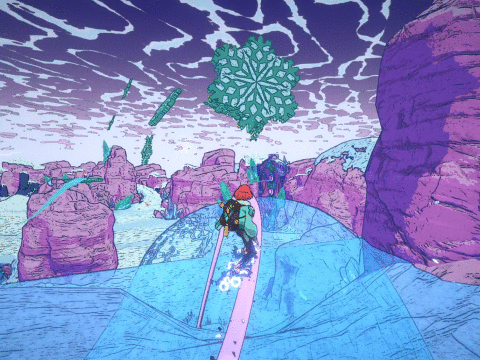
Let’s end on a high: Dungeons of Hinterberg stole my heart with a hands-off demo at Summer Games Fest last year, and having now played it I can confirm it plays exactly as it looks. As in: delightfully.
Hinterberg is a dreamy, breezy vacation of a game, where you arrive as an amateur adventure tourist in the Austrian mountain resort town in search of a bit of R&R. The mountain range is full of mystery however, and so you’ll dive into various dungeons – the term used loosely in the video gamey definition here, to effectively mean “large, self-contained, themed combat and puzzle area” – before returning to town to unwind.
The combat’s great: responsive but hefty, if a little on the easy side – although that reflects the easygoing nature of things here. Environmental puzzles are interesting, and a little more challenging, falling into that nice “pleasant brain-teaser” territory. And magical snowboarding is, unsurprisingly, rad. But the real stars are Hinterberg’s cast of affably rosy-nosed locals, who chatter away whether it’s to politely redirect you from a currently-closed gondola to a late-game location, or to talk in-depth about the strange phenomena they’re studying, or ways you can more effectively chat people up at the town’s aprés bar. This game plays like a dream vacation – it’s a delight.
-Chris Tapsell
- SEO Powered Content & PR Distribution. Get Amplified Today.
- PlatoData.Network Vertical Generative Ai. Empower Yourself. Access Here.
- PlatoAiStream. Web3 Intelligence. Knowledge Amplified. Access Here.
- PlatoESG. Carbon, CleanTech, Energy, Environment, Solar, Waste Management. Access Here.
- PlatoHealth. Biotech and Clinical Trials Intelligence. Access Here.
- Source: https://www.eurogamer.net/what-weve-been-playing-indie-preview-special-edition?utm_source=feed&utm_medium=rss&utm_campaign=feed
- 350
- 360
- 690
- a
- About
- absence
- across
- actual
- Adventure
- adventure game
- after
- Against
- also
- Although
- amateur
- an
- and
- Animation
- Another
- anyone
- April
- aptly
- ARE
- AREA
- areas
- around
- Art
- as
- aside
- At
- Atmosphere
- attempt
- austrian
- award
- away
- Baby
- back
- bar
- basic
- BE
- been
- before
- being
- BEST
- Better
- between
- beyond
- BIG
- Bit
- bland
- blocked
- bodies
- bring
- brings
- build
- but
- by
- CAN
- Cards
- carrying
- cartoon
- cartoons
- case
- challenging
- characters
- chat
- Chris
- cited
- Climbing
- Coal
- cohesive
- combat
- come
- comes
- concept
- confirm
- Construct
- construction
- context
- copper
- could
- credit
- Czech
- date
- day
- days
- deeply
- definition
- delight
- Demo
- describes
- developed
- Developer
- Devs
- dialogue
- didn
- difficult
- difficulty
- dinner
- Director
- disappointing
- dive
- dog
- don
- down
- dream
- drifter
- dungeons
- During
- each
- Early
- easy
- Editions
- eerily
- effectively
- end
- engaging
- enjoyable
- entire
- environmental
- escalating
- Eurogamer
- European
- everyone
- exactly
- expect
- explain
- extract
- extraction
- EY
- faces
- falling
- fancy
- Feature
- feeding
- feels
- few
- figured
- Film
- Final
- fish
- flying
- focusing
- For
- Forward
- from
- full
- funny
- game
- Games
- Gaming
- GDC
- Gear
- gem
- generated
- genuinely
- Get
- giant
- gif
- gift
- go
- great
- Greek
- guns
- had
- halfway
- Hard
- has
- having
- he
- heads
- heart
- hefty
- help
- here
- High
- highlighting
- him
- his
- Home
- hope
- Hopefully
- horses
- How
- How To
- however
- HTTPS
- i
- if
- igf
- in
- in-game
- Indie
- Inferno
- INSIDE
- inspirations
- instead
- interaction
- interesting
- into
- Is
- IT
- items
- ITS
- itself
- jpg
- just
- kids
- kind
- kit
- lands
- large
- last
- late
- leading
- light
- like
- Little
- ll
- local
- location
- longer
- looking
- looks
- Looter
- lost
- lot
- lots
- machine
- made
- Magic
- make
- man
- manipulating
- manual
- many
- March
- me
- mean
- meaning
- means
- Mechanics
- meet
- Merchant
- Middle
- might
- minimal
- mix
- Modern
- moment
- mood
- more
- Mountain
- much
- my
- Mystery
- narrative
- nature
- navigate
- need
- needed
- Neon
- New
- Nice
- no
- now
- of
- off
- official
- Old
- older
- on
- once
- One
- only
- or
- original
- Others
- our
- out
- oven
- over
- own
- palette
- Past
- PC
- People
- Picked
- pink
- pipes
- plants
- plato
- plato data intelligence
- platodata
- platogaming
- play
- played
- player
- Playing
- plays
- poor
- presenting
- Preview
- previous
- proof
- proper
- ps5
- Puzzle
- quick
- R
- Rail
- range
- rapidly
- Rare
- RE
- Reading
- Real
- really
- reason
- redirect
- refined
- reflects
- regular
- remains
- Resort
- Resources
- responsive
- returning
- reveal
- right
- roguelite
- role
- runs
- Russian
- s
- sadly
- Said
- Santa
- scratch
- Screen
- Search
- secrets
- seems
- Series
- several
- shape
- shift
- Shifts
- shot
- shots
- showing
- side
- Simple
- simpler
- single
- Sitting
- sky
- slow
- small
- Snapshot
- So
- solar
- some
- something
- Soul
- sounds
- special
- Spot
- Stars
- stay
- stole
- Story
- strange
- studying
- style
- summer
- suspended
- Swing
- Switch
- table
- Take
- takes
- talk
- task
- tasks
- term
- territory
- test
- than
- thank
- that
- The
- the world
- their
- Them
- Themed
- there
- therefore
- they
- thing
- things
- this
- those
- though
- Through
- time
- to
- together
- tone
- topic
- touch
- town
- traded
- trailer
- tried
- true
- tutorial
- tv
- twist
- unlike
- Unwind
- up
- used
- using
- vacation
- variations
- various
- varying
- ve
- venture
- very
- Video
- Village
- violently
- vs
- walking
- watering
- way
- ways
- we
- week
- welcome
- What
- What is
- what we've been playing
- whatever
- when
- where
- whether
- while
- WHO
- will
- windows
- with
- without
- won
- world
- write
- xbox
- xbox series
- Xbox Series X/S
- year
- yet
- you
- young
- your
- youtube
- zephyrnet
